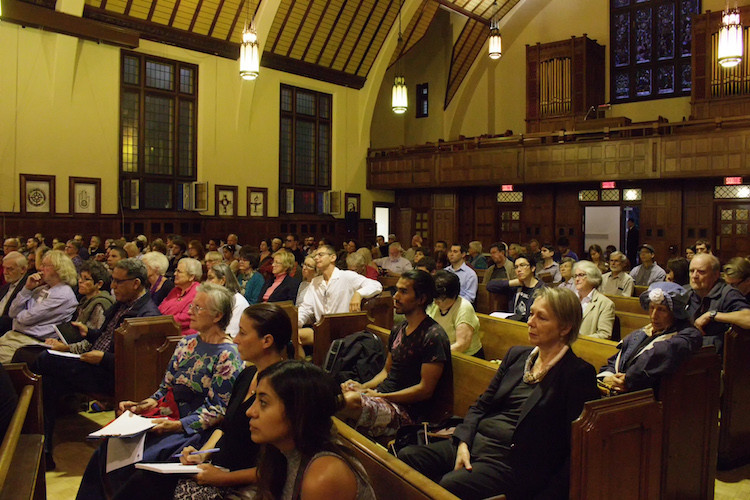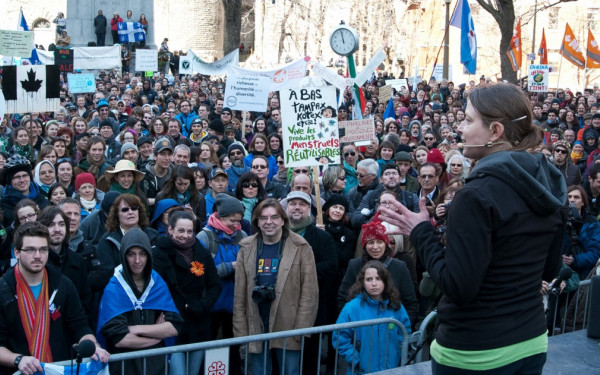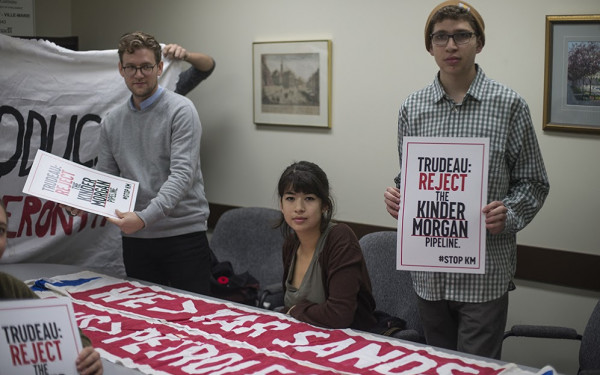Marc Garneau Directly Addresses Citizens on Climate Change
Public Consultation Opens Floor for Criticism of Federal Environment Policy
Around 200 concerned citizens and environmental activists packed into the Loyola Chapel on Thursday evening to listen—and be heard—on the topic of Canada’s climate change plan.
The event was hosted by Marc Garneau—the federal minister of transport—as part of a series of public consultations on climate change, which the federal government says will help shape its policy on the matter.
“I want feedback from you. The government of Canada wants feedback from you,” Garneau told the audience at the start of the event. “Your comments will all be fed in as input to the government’s work in […] addressing the environmental challenges that we’re talking about.”
Audience members were invited to line up in front of microphones and share their concerns and suggestions on climate change policy, and the minister took several opportunities to directly answer the public’s comments.
The event drew sometimes sharp criticism of the Trudeau government’s approach to the environment, while some audience members took the time to express their gratitude for the consultation.
“I want to say thank you for listening to us,” said Victor Frankel, secretary-general of the McGill Post Graduate Students’ Society. “This is what democracy looks like, and this is a wonderful opportunity.”
Hot Topics: Carbon Tax and Individual Responsibility
Several audience members voiced their support for a price on carbon as a positive step towards reducing greenhouse gas emissions, and while Minister Garneau said a carbon tax is a priority, he emphasized that each province would work out its own policies for dealing with climate change.
“It’s not the federal government that’s going to decide [everything],” Garneau said. “Each province is a bit different, and we want to allow them to decide how they’re going to do it.”
Beyond the role of provinces, Minister Garneau also underscored the importance of individuals doing their part by making smarter decisions on things like transportation and diet.
Alex Tyrrell, leader of the Green Party of Quebec, was in attendance and took Minister Garneau to task for these comments, saying that the federal government was trying to pass the buck on climate policy.
“I find it is a complete lack of leadership to refuse to take a position on a federal carbon tax,” Tyrrell told Garneau. “Justin Trudeau was elected on a promise of doing things differently, and delegating this responsibility to the provinces is unacceptable.”
“The fact that you’re talking about individual actions when you’re the minister of transport demonstrates this lack of leadership,” he continued.
Energy East Pipeline Casts a Shadow
Several times over the course of the consultation, audience members brought up the proposed Energy East pipeline and the delayed National Energy Board review, saying that the federal government needs to step in and scrap the project.
The minister responded by touting the importance of the NEB review, a process which he said was based on “independence” and “neutrality”.
“I’m sure that a lot of people will get a chance to give their input — those who are against [the pipeline], and those who are in favour of it,” Minister Garneau said in an interview with The Link. “We need to do the homework without jumping to the conclusion at this point that it’s too dangerous. Let’s do the process, and let’s come up with a report at the end that is the product of complete consultation.”
But Marcus Peters of the group Divest Concordia says that a consensus has already been reached that opposes the Energy East pipeline.
“[Minister Garneau] was still using the same bullshit to describe it, [saying] that we’re going to have a thorough scientific review, and we’re going to consult indigenous communities, and talk to the different stakeholders,” Peters said. “All of that has been done, and the answer is ‘no.’”
Tyrrell agrees that enough information is available to make a decision on the Energy East pipeline, and he called on the federal government to intervene.
“We know that this pipeline is incompatible with the fight against climate change, so no matter what kind of process they set up to hear the different sides and examine it, the facts are on the table today,” Tyrrell said in an interview. “[The Federal Government] can cancel that pipeline now, and the fact that they’re unwilling to do it shows their lack of sincerity on the environment.”
Will Public Consultations Affect Policy?
Throughout the evening, Minister Garneau said that public consultations are a key component to the government’s approach to addressing climate change, and that Canadians’ thoughts on the issue are being seriously considered.
“I thought [tonight’s consultation] was a very healthy process,” Garneau said. “People are speaking from the heart, they have a lot of strong convictions, and the whole purpose for me was to be able to listen to them and to find out what is really on their minds.”
However, some attendees expressed skepticism about the impact that these consultations will have on federal policy.
“[The Liberals] essentially have the dream position for a government in power: they have a majority government, they’ve had the longest honeymoon period in Canadian political history, and they’ve made these promises that are very achievable, [but] they’re still hesitating and looking for a more solid mandate from the public,” Peters of Divest Concordia explained.
“I would love to be optimistic about their next steps, but I think so far it’s safe to say that this government has been more interested in the PR around all of these issues than actually taking real action on them.”

_750_500_90.jpg)

_750_500_90.jpg)



_600_375_90_s_c1.jpg)
